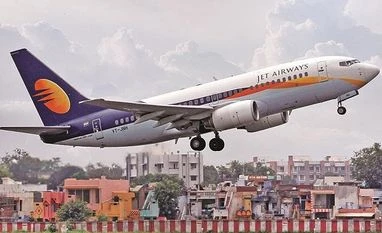Some lessors of Jet Airways have begun terminating lease deals over unpaid dues and are preparing to move the leased planes abroad, escalating a crisis for the cash-strapped carrier, five sources with knowledge of the matter told Reuters.
Two lessors have applied to the Directorate General of Civil Aviation (DGCA), India's aviation regulator, to deregister at least five planes leased to Jet, three of the sources said.
Termination of lease agreements normally precedes applications made to the DGCA.
Jet has delayed payments to its pilots, suppliers and lessors for months and defaulted on loans after racking up over $1 billion in debt. While it is now meeting some of its payments, it's survival hinges on emergency funding from the country's main state-backed banks.
Frustrated by the unpaid dues, Jet's lessors, including many of the world's biggest players such as GE Capital Aviation Services (GECAS), Aercap Holdings and BOC Aviation have already taken control of some their planes, sources said, leading to the grounding of nearly a third of its 119 aircraft fleet.
Once the planes are deregistered, they can be taken out of the country and leased to other airlines.
One of the sources with direct knowledge of the matter said that of the planes being deregistered, two are potentially being flown to China and one to Ireland.
Another industry source said GECAS and Aercap had filed an application to deregister a total of five planes. Lease terminations could hit the already fragile confidence of business partners of Jet.
Jet did not respond to requests for comment. AerCap declined to comment and there was no immediate response from GECAS to a query sent outside normal business hours.
All the sources declined to be identified due to the sensitivity of the matter.
Founder chairman Naresh Goyal, who transformed Jet to India's biggest full-service carrier from its humble start 25 years ago, has said it is thrashing out a bailout plan, led by the state-run banks and Abu Dhabi's Etihad Airways.
Before the groundings, Jet controlled over a sixth of the market, capitalising on a boom in flying. But high fuel taxes, a weak rupee and ultra-low fares have hurt profitability.
Jet's financial troubles have rekindled memories of Kingfisher Airlines' collapse in 2012 that forced lessors to write off millions of dollars.
Last week, FLY Leasing Ltd said it had grounded three planes on lease to Jet and would take them back and reallocate them elsewhere if the airline failed to get approvals for its restructuring plan this month.
Jet has been forced to cancel hundreds of flights and irate passengers have turned to social media platforms to express their outrage.
Repossession still tough
After Kingfisher Airlines' disorderly collapse in 2012, India modified rules in line with the Cape Town convention, an international treaty that makes it easier for foreign lessors to repossess aircraft during payment defaults.
India said last year it was seeking to revise some local laws, which still conflicted with the full implementation of the convention making it a more complicated process in India than in some other countries.
In theory, lessors have the option of filing a complaint with the government, which in turn can cancel the registration of a plane within five working days, allowing lessors to repossess it subject to certain conditions, including unpaid dues. However, this is often a long process.
According to a government notice issued in November, after any application is filed, all airport operators and other private entities, within five days, need to inform the lessor and DGCA of pending dues related to that aircraft for three months preceding the date of deregistration.
Only after these are cleared, the lessor is allowed to fly the aircraft out of India. On March 11, DGCA clarified that some of the entities included airports, fuel vendors, tax authorities and customs departments, a move that could further complicate reposessions.
Akshay Nagpal, partner at law firm L&L Partners, said that while this notice is aimed at asking the government and other agencies to be more vigilant in seeking their dues, "one cannot rule out lessors viewing this as a step back from their long-time demand of making repossession easier."
Unlock 30+ premium stories daily hand-picked by our editors, across devices on browser and app.
Pick your 5 favourite companies, get a daily email with all news updates on them.
Full access to our intuitive epaper - clip, save, share articles from any device; newspaper archives from 2006.
Preferential invites to Business Standard events.
Curated newsletters on markets, personal finance, policy & politics, start-ups, technology, and more.
)